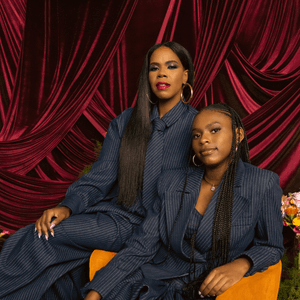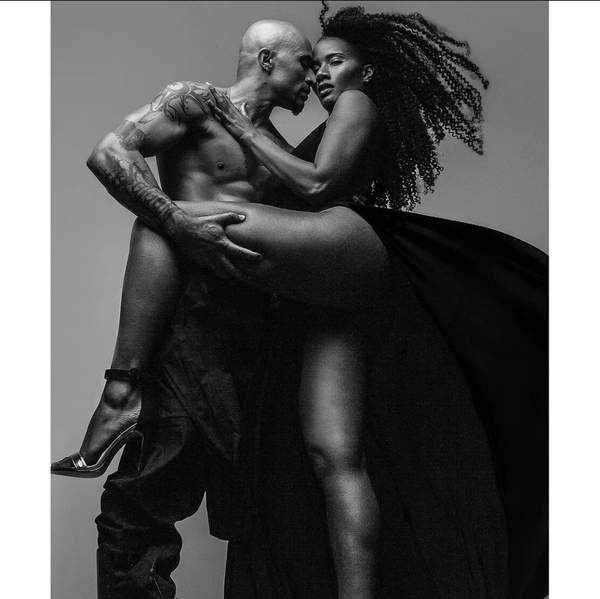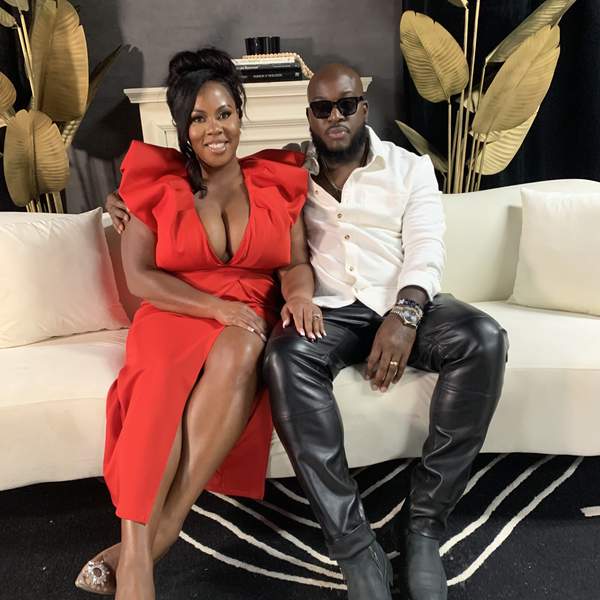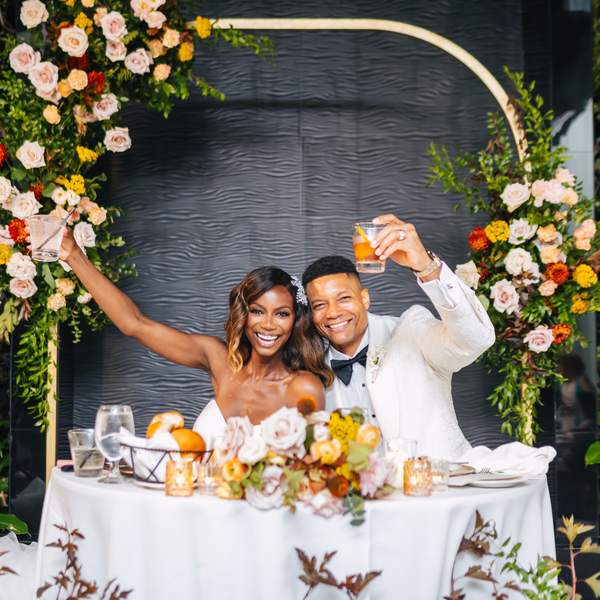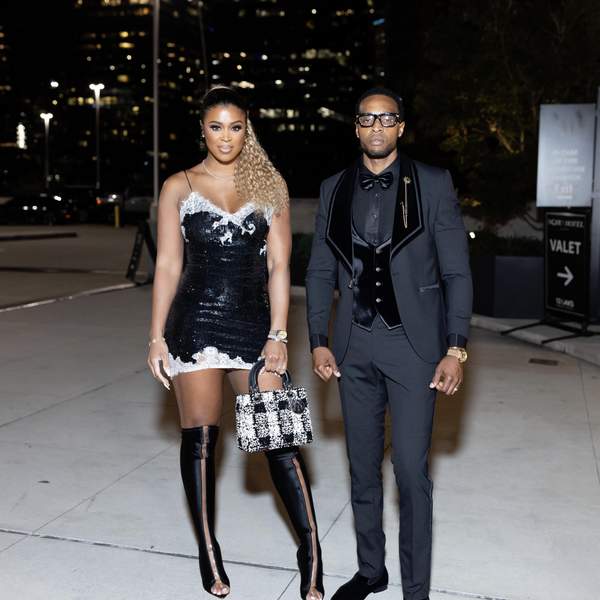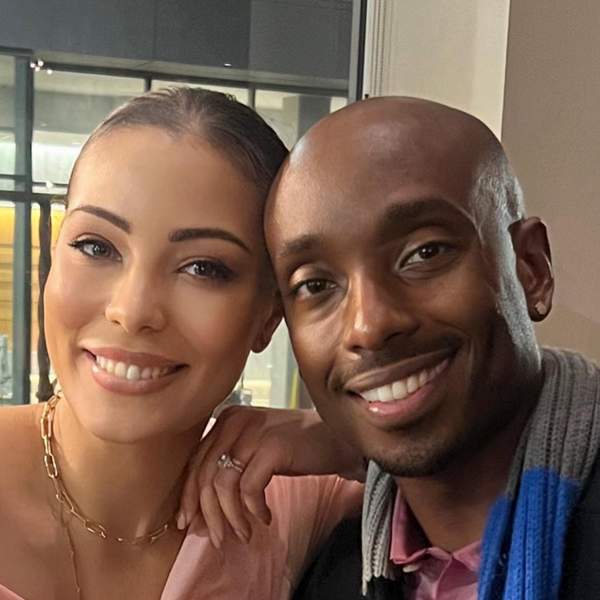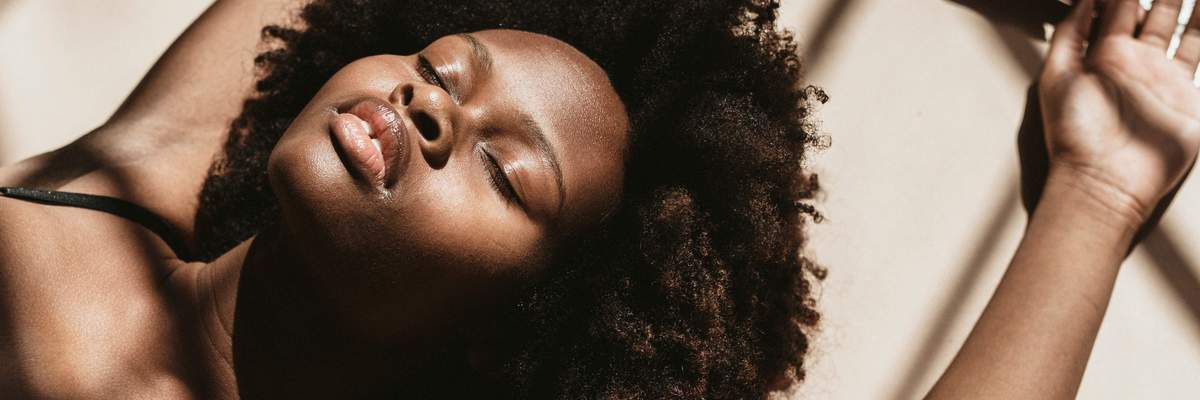How We Met is a series where xoNecole talks about love and relationships with real-life couples. We learn how they met, how like turned into love, and how they make their love work.
When it comes to sexuality, there have always been societal limitations centered on what is "acceptable." However, with more honest conversations about how fluid sexuality and sexual expression can be, now there are so many more opportunities for self-exploration and taking back ownership of our identities again. One couple that is living their truth and being sexual beings unapologetically while living and loving their lives are Jasmine Johnson and King Noire.
For some background, this husband and wife have been in a relationship for 10 years. Jasmine Johnson, aka Jet Setting Jasmine, is a psychotherapist and a Master Fetish Trainer, along with her husband, King Noire. Jasmine has over 20 years of experience in the industry. King Noire is an accomplished writer, artist, MC and global activist. As a couple in love and in business, Jasmine and King are owners of their award-winning adult entertainment company, Royal Fetish Films. Through their work, Jasmine and King have combined their talents and passions to produce erotica that stimulates audiences to explore their sexual boundaries.
In this installment of xoNecole's How We Met, Jasmine and King shares how their love continues to grow through intentionality, selflessness, and finding strength in baring it all.
How They Met
Jasmine Johnson: King and I met on a radio show. I was interviewing him on a podcast and the focus was porn and relationships. It was mainly about how people in the porn industry find relationships. We connected outside of the podcast and, when we did, we shared our personal bios to each other. We let each other know, 'This is what I've been through, this is where I'm at, and this is where I'm trying to go.'
King Noire: Yes, so we met on the podcast and I was very interested in getting to know Jasmine more. Jasmine was super straightforward and direct with her questions. I liked that. So I slid into her DMs and asked if we could work on our 'talents' together. At the time, Jasmine was teaching pole dancing and I was doing erotic touch massages. We both were very intentional about getting involved with each other.
First Impressions
King: After connecting outside of the podcast, Jasmine booked a session with me [for an erotic touch massage]. For me, that let me know that she respects what I do. When I saw her in person, I thought she looked better than her pictures. The first thing I noticed is that she has a very vibrant, illuminating smile. Jasmine's smile makes me want to smile.
Jasmine: Wow. How am I supposed to follow that? Before I met King in person, what attracted me to him was that he is a multi-dimensional man. The way that he is very in tune with who he is. I liked how he was not trying to shut off any of those dimensions. At the time, I was learning about all the dimensions of myself. So I thought, 'Well, here is a man who is educated, cares about his people, and likes to have a good time.' I also liked that he had a business pleasing women. I enjoyed my time with him, the conversation that we had, and the experience overall. He did not disappoint at all.
"What attracted me to him was that he is a multi-dimensional man. The way that he is very in tune with who he is. I liked how he was not trying to shut off any of those dimensions. I also liked that he had a business pleasing women. I enjoyed my time with him, the conversation that we had, and the experience overall. He did not disappoint at all."

Courtesy of King Noire and Jasmine Johnson
Making It Official
Jasmine: There wasn't exactly a clear moment for me. Our relationship grew gradually and the shift had a nice slow incline. We talked about each step along the way, so it was very thoughtful. For example, one of us would say, "I'm thinking about you all day long and I wish you were here with me." Instead of saying, "I wish you here with me and I want you all to myself."
King: It has been gradually growing and I think that is the best way to put it. We continue to grow together and how we express our interests and admiration in each other.
Dismantling Myths Around Polyamory
King: The biggest myth about polyamorous relationships is that people think it is always sexual. It is so much more than that. My expression for love is just different and it is not solely about having sex with people. When it comes to Jasmine, how we connect and share with one another makes us stronger. So being honest about how we may like to do certain things differently or we have separate interests is important. With polyamory, it's recognizing that you can't be everything to anybody.
For example, Jasmine wants to go to a certain event and the event is not really my thing. If I'm there, I am not going to have as much fun as she will have. To me, I would be taking away from her enjoying it if I told her that I didn't want her going with someone else. When you truly love a person, you want them to experience all of the things that they enjoy. So I want her to enjoy herself, do her thing, and tell me how it went when she comes back home.
Jasmine: I completely agree with King about the sex part. I know a question I get asked a lot is, "Oh, do you get jealous when your husband sleeps with other people?" Truly, when I think about King and I's relationship, it is about the quality time we spend with each other. Also, when people think about polyamory, people assume that both of the individuals have to be polyamorous. There can be mixed styles of orientation in one relationship.
We both tried different relationship styles and chose what worked for us. I was oriented towards monogamy when I met King. Now I am not saying I just threw in my monogamy card, because I didn't. I just became more open to the possibility and explored what other ways of being together would look like. For years, we have been able to have a sustainable and beautiful relationship in love.
"The biggest myth about polyamorous relationships is that people think it is always sexual. It is so much more than that. My expression for love is just different and it is not solely about having sex with people. When it comes to Jasmine, how we connect and share with one another makes us stronger. With polyamory, it's recognizing that you can't be everything to anybody."
The Fears Around Different Relationship Styles
Jasmine: King was really certain about who he was and his relationship style. For me, the fear was if I reject this, then I miss the opportunity to experience life with this man. I also had a fear of "failing" at being good at being poly or exploring what our relationship could look like. I questioned if it would possibly jeopardize the bond we had. Both of these fears, either way, the outcome was not going to be him and I. So I leaned into those fears and I'm glad we figured it out.
King: I didn't have any fears from her specifically, but in general. I only had one experience before Jasmine where I felt I was able to fully be polyamorous. But it still felt limiting because I was still learning myself. I think the fear was as we got down the road, is she (Jasmine) going to change up on me? That fear of her not trusting me. This happens whether you are in a monogamous relationship or a polyamorous relationship. People were trying to tell me what my love was for my partner and I felt boxed in. But Jasmine was that person I wanted to dive into, get to know, and share all of myself with her. At the same time, I don't want to compromise who I am because of a relationship. I want to enhance myself because of the relationship.
Love Lessons
King: I don't know how cliche this will sound, but Jasmine really helped me express and find myself. With Jasmine, she is very confident in who she is and how she defines herself. She confirms that I also have the space to do that for myself. Those fears that I just spoke about were fears from past relationships and she made me realize that that is not a part of who she is. People say everyone comes with baggage and that shit is real. You realize you have to check your luggage somewhere else, because this is a new trip right here.
Jasmine: To love yourself is to take a hard look at a lot of aspects of yourself. You have to love the parts of yourself that you are not quite finished with yet. So much of King and I's relationship is helping others, but more importantly helping ourselves. A lot of the trauma work [I've done], King has been front and center.
Really doing that healing and processing it all, we really did it together and figured out how to make it pretty for y'all. How to express our sexuality to the world was really digging into the why's and meanings of who we are individually. From being in a relationship with King, I have also learned how to love myself differently. I don't have to do everything by myself anymore. When you have a partner to really appreciate the moments when life slows down, it's beautiful.
"From being in a relationship with King, I have also learned how to love myself differently. I don't have to do everything by myself anymore. When you have a partner to really appreciate the moments when life slows down, it's beautiful."
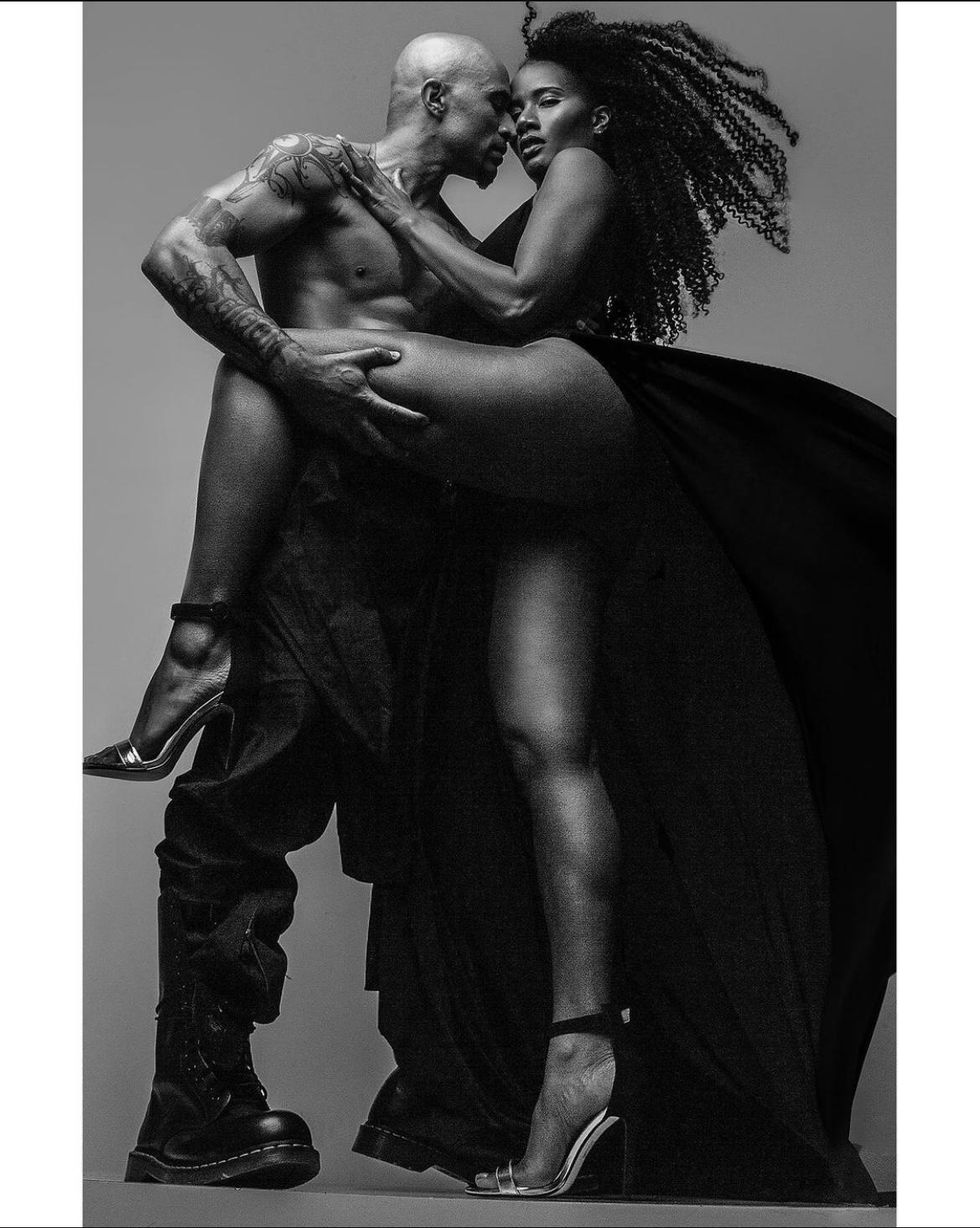
Courtesy of King Noire and Jasmine Johnson
Blended In Family, Love & Legacy
Jasmine: We have a blended family. We started co-parenting two to three years into our relationship. I think there is a huge stigma around blended families, where people think that when you have a blended family, it is going to be lacking something. I used to think this and it honestly took a while for me to believe that King could father all of my children. It wasn't necessarily about him expressing himself as a man and a father. It was really these preconceived notions and judgements of, 'No one is going to love your kids like you.'
The idea that someone in a blended family is not going to love your kids as much as if they were the biological parent is the furthest thing from the truth. My children have a full and complete family. Black families work hard and we continue to work while also through the expression of love. Black love does not have to look like that traditional Eurocentric idea. Black love can look like whatever it needs to look like for people as long as values are respected and aligned.
King: Building off of that, when you think about it, African-American family units don't just make lemonade out of lemons. We make everything with lemons]! History has shown us that the Black family has been broken up since we got here. People try to create this negative narrative around the Black family to make us feel bad. But I look at how we have created our definition of what family looks like, blood or not. We have always said it takes a village to raise a child. Family is more about who you love, how you love, and the responsibility of how you show up for your loved ones.
Common Ground
King: I think just finding more ways to love each other. What I mean by that is, how can I show you that I love you more within moments that we share? Within the Black love story, I believe we are afraid to expose the bareness of our souls. The more you expose yourself to somebody, we call it vulnerability. But I think of it as more of a strength. When you have a partner, if there is an area that you lack, your partner always has your back. They fill that space for you. So when we are able to show the totality of who we are, we are also able to fill in each other's blank spaces.
Jasmine: King has this motto for his music, which is, "Freedom, Justice, and Equality." I feel these three principles really cover every aspect of our lives. They make a really easy formula for our love. There is freedom in our love and I am not talking about sex and relationships. Freedom to respect our interests and support each other through them. The second one is Justice. There's a lot of accountability in our love. No one just gets away with anything around here. In terms of Equality, I have been able to see it as we come as equals to the table. We may not agree on everything, but we show up as humans and no one is inferior to the other.
If one wins, we all win.
For more of Jasmine and King, follow them on Instagram @jetsetjasmine and @therealkingnoire.
Featured image courtesy of Jasmine Johnson and King Noire


